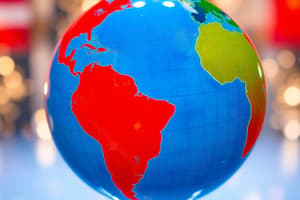Podcast
Questions and Answers
Which of the following best describes the core idea behind the phrases 'good things come in small packages,' 'it's a small world after all,' and 'the world has shrunk' in the context of globalization?
Which of the following best describes the core idea behind the phrases 'good things come in small packages,' 'it's a small world after all,' and 'the world has shrunk' in the context of globalization?
- The cultural homogenization leading to a uniform global identity.
- The increasing interconnectedness and interdependence of societies worldwide. (correct)
- The economic dominance of smaller nations in the global market.
- A reduction in the physical size of the planet due to technological advancements.
Why do multiple definitions of globalization exist?
Why do multiple definitions of globalization exist?
- Because globalization is intentionally kept vague to allow for political manipulation.
- Because scholars from different disciplines view globalization through different lenses. (correct)
- Because there is no widespread agreement on the negative impacts of globalization.
- Because globalization is a recent phenomenon and lacks a historical consensus.
What is the primary characteristic of economic globalization?
What is the primary characteristic of economic globalization?
- The standardization of labor laws across different countries.
- The decline in cross-border movement of goods and services.
- The growing integration and interdependence of national economies. (correct)
- The increasing isolation of national economies to foster domestic growth.
Which of the following is NOT typically considered a key component of economic globalization?
Which of the following is NOT typically considered a key component of economic globalization?
What is a significant impact of political globalization on nation-states?
What is a significant impact of political globalization on nation-states?
How does political globalization manifest itself in the contemporary world?
How does political globalization manifest itself in the contemporary world?
How does cultural globalization primarily occur?
How does cultural globalization primarily occur?
Which of the following scenarios best exemplifies the interconnectedness and multidimensional nature of contemporary global issues?
Which of the following scenarios best exemplifies the interconnectedness and multidimensional nature of contemporary global issues?
Which element is NOT typically associated with the definition of technology?
Which element is NOT typically associated with the definition of technology?
How does cultural globalization primarily manifest?
How does cultural globalization primarily manifest?
According to Steger (2005), what is a key characteristic of globalization as a process?
According to Steger (2005), what is a key characteristic of globalization as a process?
What is 'globality' described as?
What is 'globality' described as?
What does 'supra-territoriality' refer to in the context of globalization as a condition?
What does 'supra-territoriality' refer to in the context of globalization as a condition?
How does globalization as a condition affect political borders and economic barriers?
How does globalization as a condition affect political borders and economic barriers?
In what way do technological developments primarily influence globalization processes?
In what way do technological developments primarily influence globalization processes?
How does the concept of viewing the planet as a 'social space' influence our understanding of globality?
How does the concept of viewing the planet as a 'social space' influence our understanding of globality?
According to the provided content, what is the primary function of globalization as an ideology?
According to the provided content, what is the primary function of globalization as an ideology?
Which of the following policies is most aligned with the neoliberal approach often associated with globalization as an ideology?
Which of the following policies is most aligned with the neoliberal approach often associated with globalization as an ideology?
Critics of globalization as an ideology argue that it can lead to which of the following negative consequences?
Critics of globalization as an ideology argue that it can lead to which of the following negative consequences?
In what way does the content describe globalization as a 'condition'?
In what way does the content describe globalization as a 'condition'?
Which of the following best captures the meaning of 'market fundamentalism' as it relates to globalization?
Which of the following best captures the meaning of 'market fundamentalism' as it relates to globalization?
Considering globalization as a multifaceted phenomenon, what distinguishes its function as a 'process' from its function as an 'ideology'?
Considering globalization as a multifaceted phenomenon, what distinguishes its function as a 'process' from its function as an 'ideology'?
Globalization fosters innovation and economic growth, but also raises concerns about inequality, cultural erosion, and national sovereignty. Analyzing these concerns requires understanding globalization’s:
Globalization fosters innovation and economic growth, but also raises concerns about inequality, cultural erosion, and national sovereignty. Analyzing these concerns requires understanding globalization’s:
How does the content suggest one can effectively navigate the opportunities and challenges presented by globalization?
How does the content suggest one can effectively navigate the opportunities and challenges presented by globalization?
Flashcards
Globalization
Globalization
The increasing interdependence of societies through social, economic, political, and cultural relationships.
Economic Globalization
Economic Globalization
International movement of goods, capital, services, technology and information, creating interdependence of economies.
Political Globalization
Political Globalization
It refers to the growth of the worldwide political system, both in size and complexity.
Cultural Globalization
Cultural Globalization
Signup and view all the flashcards
Technology
Technology
Signup and view all the flashcards
Globalization as a Process
Globalization as a Process
Signup and view all the flashcards
Tracing the Roots of globalization
Tracing the Roots of globalization
Signup and view all the flashcards
Globalization as a Condition (Globality)
Globalization as a Condition (Globality)
Signup and view all the flashcards
Trans-planetary relations
Trans-planetary relations
Signup and view all the flashcards
Supra-territoriality relations
Supra-territoriality relations
Signup and view all the flashcards
Globalization as a Social Condition
Globalization as a Social Condition
Signup and view all the flashcards
Globalization as Ideology
Globalization as Ideology
Signup and view all the flashcards
Core Tenets of Globalization Ideology
Core Tenets of Globalization Ideology
Signup and view all the flashcards
Neoliberalism
Neoliberalism
Signup and view all the flashcards
Criticisms of Globalization Ideology
Criticisms of Globalization Ideology
Signup and view all the flashcards
Market Fundamentalism
Market Fundamentalism
Signup and view all the flashcards
Characteristics of Neoliberalism
Characteristics of Neoliberalism
Signup and view all the flashcards
Globalization as a Condition
Globalization as a Condition
Signup and view all the flashcards
Study Notes
- Societies are becoming increasingly interdependent due to a constantly changing world.
- These societies have more social, economic, political, and cultural relationships.
- Arthur C. Clarke noted that phrases like "good things come in small packages," "it's a small world after all," and "the world has shrunk" describe global conditions.
- The world appears smaller today than it actually is.
- Many scholars have tried to define globalization, resulting in different and sometimes contradicting views.
- Globalization cannot be contained within a specific time frame or apply to all people and situations.
- Globalization encompasses multiple simultaneous processes that involve the economy, political systems, and culture.
- Social structure is directly affected by globalization.
- Globalization appeared in Webster's Dictionary in 1961.
- Definitions of globalization can be classified as broad and inclusive or narrow and exclusive.
- Ohmae stated in 1992 that "globalization means the onset of the borderless world."
- There can be as many definitions of globalization as there are scholars studying it.
- The definition of globalization varies across disciplines.
- Scholars from political science, economics, history, sociology, and philosophy have examined globalization using analytical tools and methods specific to their disciplines.
- The problems and issues that characterize the contemporary world are interconnected and multidimensional.
Dimensions of Globalization
- Economic globalization refers to the widespread international movement of goods, capital, services, technology, and information. It involves increasing economic integration and interdependence of national, regional, and local economies across the world through intensified cross-border movement of goods, services, technologies, and capital.
- It primarily comprises the globalization of production, finance, markets, technology, organizational regimes, institutions, corporations, and labor.
- Political globalization refers to the growth of the worldwide political system in both size and complexity.
- That system includes national governments, their governmental and intergovernmental organizations, and government-independent elements of global civil society, such as international non-governmental organizations and social movement organizations.
- A key aspect of political globalization is the declining importance of the nation-state and the rise of other actors on the political scene.
- The creation and existence of the United Nations is one of the classic examples of political globalization.
- Cultural globalization refers to the transmission of ideas, meanings, and values around the world in a way that extends and intensifies social relations.
- The process is marked by the common consumption of cultures diffused by the Internet, popular culture media, and international travel.
- This has added to processes of commodity exchange and colonization.
- Cultural globalization involves the formation of shared norms and knowledge with which people associate their individual and collective cultural identities.
- It brings increasing interconnectedness among different populations and cultures.
- Technology is defined as the socialized knowledge of producing goods and services.
- Technology has five important elements: production, knowledge, instruments, possession, and change.
- Technological developments are conceived as the main facilitator and driving force of most globalization processes.
Globalization as a Process
- Globalization is viewed as a multidimensional set of social processes.
- It generates and increases "worldwide social interdependencies and exchanges while at the same time fostering in people a growing awareness of deepening connections between the local and the distant" (Steger, 2005:13).
Globalization as a Condition
- Globalization is also referred to by scholars as globality.
- Scholte (2008) refers to globality as a social condition characterized by trans-planetary connectivity and supra-territoriality.
- In terms of trans-planetary relations, globality establishes social links between people in different places.
- The planet is treated as a social space or an arena of social life, not just a collection of geographical units.
- Supra-territoriality relations are "social connections that transcend territorial geography" (Scholte, 2018: 1480).
- Globalization as a social condition is characterized by thick economic, political, and cultural interconnections and global flows that render political borders and economic barriers irrelevant (Steger, 2008).
Globalization as Ideology
- Steger (2005), following Michael Freeden, explains that globalization exists in people's consciences as a set of coherent and complementary ideas and beliefs about the global order.
- Globalization as an ideology promotes the belief in a highly interconnected world where economic, political, and cultural integration lead to progress and prosperity.
- It supports free trade, open markets, technological exchange, and global governance structures, often emphasizing neoliberal policies such as deregulation and privatization.
- Critics argue that this ideology benefits powerful nations and corporations while exacerbating inequality and eroding local cultures and sovereignty.
- Globalization is also referred to as market fundamentalism.
- Neoliberalism maintains that human well-being is advanced within an institutional framework characterized by free markets, a minimal state, free trade, the absence of economic regulation, and strong individual property rights.
- Globalization is a political belief system that benefits a certain class.
- Globalization functions as a process, a condition, and an ideology; it is a multifaceted phenomenon.
- As a process, it drives increasing interconnectedness through trade, technology, and communication.
- As a condition, it reflects the current reality of global interdependence, shaping economies, politics, and cultures.
- While globalization fosters innovation and economic growth, it also raises concerns about inequality, cultural erosion, and national sovereignty.
- Understanding its complexities helps in navigating both its opportunities and challenges.
Studying That Suits You
Use AI to generate personalized quizzes and flashcards to suit your learning preferences.




